
Tuesday May 21, 2019
By Valérie Gauriat
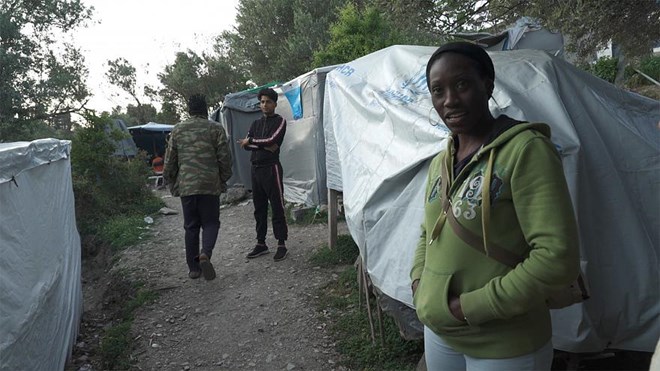
Sarah is from Uganda. A former university lecturer in political science, and civil rights activist, she fled her country where her security was at risk. She has been surviving in the so-called migrants "jungle" on the Greek island of Samos for months. We met her while reporting on the ordeal of both refugees and locals on the island, for a special edition of our investigation magazine Insiders-Unreported Europe. She takes Euronews reporter Valérie Gauriat on a tour of what she describes as hell on earth.
The Greek island of Samos is known for its picturesque landscapes. It also hosts a darker reality: one of the so-called hotspots, or registration centers for migrants, set on the Greek islands of the North Aegean sea.
Build for 650 people, the camp is overcrowded, as some 4000 migrants are stuck on Samos. Dozens of tents pile up around the center, forming what both locals and refugees are now used to calling "the jungle".
"Welcome to my world!" jokes Sarah, as she leads us through the muddy paths straying an unsettling makeshift village of tents.
Sarah comes from Uganda. She used to be a university lecturer there and a civil rights activist. For those reasons, she had to flee her country, where her life was at risk.
The jungle has been her home for the past eight months, as for thousands of other refugees stranded on the island, waiting for a reply to their asylum requests.
"Every man for himself and God for us all"
''Here we wait for a very long time, one, two, sometimes three years, it's a big problem!" laments a young Palestinian man we meet along the way.
"The situation here is every man for himself and God for us all. Everybody is into survival. It's a jungle life, all in all", states Sarah, before leading us to one of the many piles of garbage that strew the area.
"We live amidst rats, snakes, and all these vermin. But we have to move on. Because you can't just stop living. That's life, that's reality... And this is Europe?", she asks somberly.
Around us, shabby tents patched with shreds of plastic sheeting, many of them ironically labeled "UNHCR", hang pitifully on the slopes of the woods. "Some families live in there", comments Sarah, sternly.
We make our way further into the jungle. Rows of sturdier looking tents, most of them equipped with wooden doors, offer a disquieting sight. They belong to the luckiest, who could afford to pay for them.
''This is the VIP area." says Sarah, ironically, then, more seriously: "people try to make the best out of life here.''
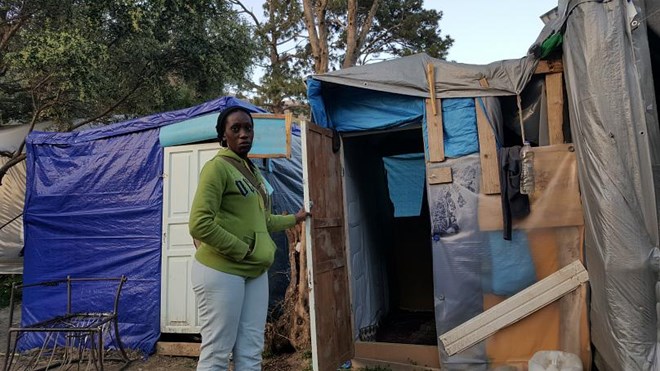
"This is the VIP area" says Sarah, "but life here is hell on earth"-Valérie Gauriat
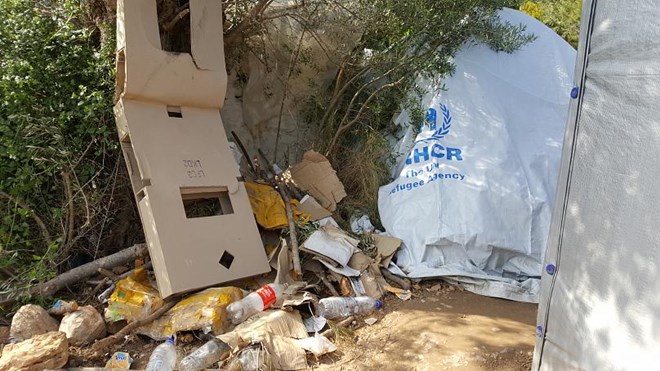
A world of darkness
A man is busy making repairs in one of the smaller tents: his workshop.
"Sunday is the chief architect of this area", explains Sarah, as she greets her friend.
In the camp, there are architects, plumbers, electricians, carpenters, engineers, and teachers. They try to improve the living conditions in the jungle as best they can. In the "VIP area", tents are garnished with second-hand furniture and carpets, gathered from the city streets and dumps.
But this cannot erase the harsh realities of the jungle.
''I manage this place. I try to keep myself fit, and I work out, just to forget about a few things. If not, I will die in silence!'', booms Sunday, a tall athletic man. "From the entrance of this place to the end, it's all about darkness. Do you understand? It's all about darkness! We are not feeling good here.'', he concludes, in a helpless gesture, before running off to his workout session, under the trees.
We continue our visit through the eerie village. Here and there, tremors of children's shrieking laughter, music bursting out from ghetto blasters, fragmented chatters in English, French, Farsi or Arabic, rise from behind the plastic walls.
"We have a lot of thieves, we call them Ali Baba"
"Please come in, you're most welcome!' smiles Sarah, as she opens the padlock closing the white wooden door of a tiny square tent. "This is where I live", she smiles, lets us in her neatly kept dwelling. "We have a lot of thieves here, we call them Ali Baba".
Not an inch of the small shelter is wasted. "This is my small mini kitchen", says Sarah, showing us the chest where she stores a few utensils, a teapot, and a gas burner she uses for cooking. In a corner of the tent, bottles of water and packs of tissue are huddled next to a bucket. "I'm a woman, I can't go out at night, so I use it as a toilet", she explains matter of factly.
"I also have ventilation", she adds, opening the plastic window framed with wood, cast into a side of the tent. She keeps it closed at night: "we have problems with the mice and the rats. So I hang up my foodstuffs up here."
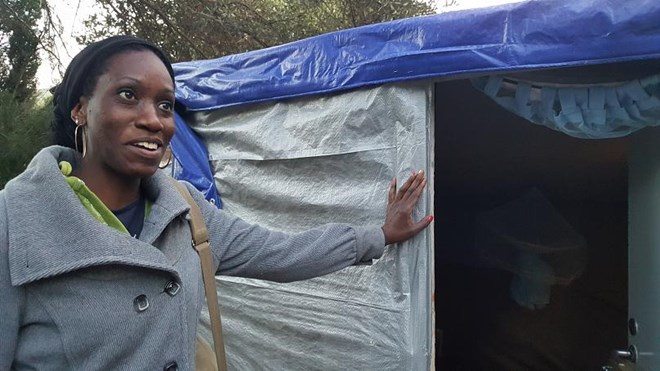
Sarah's tent, her home in Samos-Valérie Gauriat
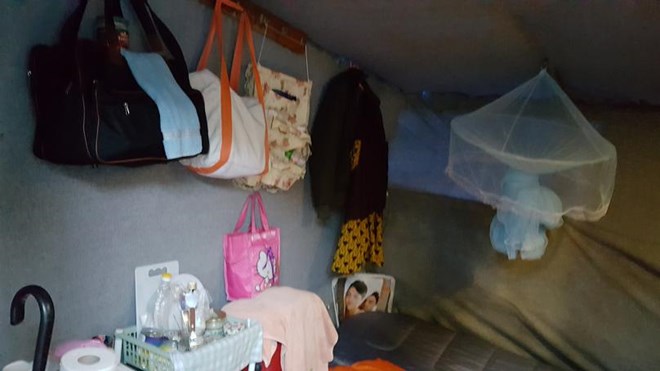
At the back of the tent, a small bed lies on a wooden structure, covered with a thin mattress, and a thick sleeping bag, her prize item, along with her mosquito net.
She keeps an alarm constantly with her at night. Not so long ago, her phone was stolen during her sleep. More than the constantly looming danger, what upsets her most is that she can no longer communicate with her daughters, whom she left behind her in Uganda.
They know that their mother is in Greece, but know nothing about her life in the jungle.
On another small chest near her bed, lies a bible, and a power bank for the portable lamp she uses to read at night.
Sarah picks up her coat before leading us out of her refuge. The night is falling, and the air has freshened up. She is in a hurry to go to the city, which spreads out to the seafront, only a few hundred meters from the jungle. The young woman wants to find a way to reach out to her children.
Refugees with a purpose
They are what gives her the strength to keep on fighting; for her future, and theirs.
''Yes, we are refugees, but we are refugees with a purpose, with a dream, with a hope!" she exclaims, walking down the path and along the barbed wire fence that separates the jungle from the "official" refugee center. "We are not going to be refugees for long because we know that one day, things will be better'', she promises, her voice slightly veiled, as she walks away through the darkness.
We meet Sarah again in the daytime, in a more hospitable setting.
The Alpha Center is a community center run by one of the best-known NGOs reaching out to migrants on the island, Samos Volunteers. The place is bustling with activity. Hundreds of asylum seekers come here daily, to find some comfort, leisure activities, but also legal advice, and language courses.
Sarah is one of the volunteers there. She helps women deal with the specific issues they are faced with in the camp. She also takes pride in giving English language courses.
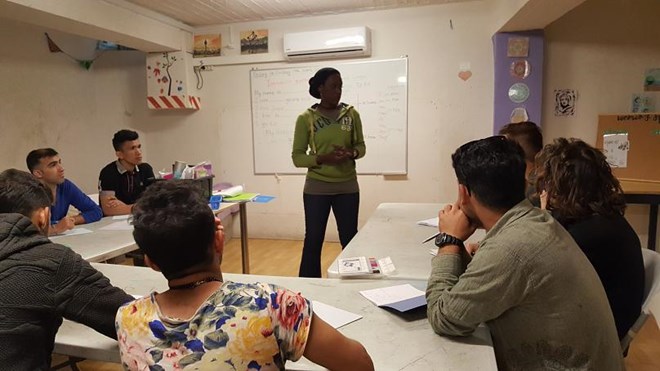
The urge to learn, the urge to live-Valérie Gauriat
The urge to live
We are invited to her classroom. Her group of students are both cheerful and attentive, as their teacher takes up their previous grammar lesson.
"The positive form is the affirmative. You affirm, that this is who I am. I am me! I am from Uganda. I am a teacher. You are! You are from Afghanistan.", she enunciates, pointing to a young man.
Carefully articulating his words, he answers gleefully: "I am from Afghanistan. I live in a tent." The class bursts out in laughter. A moment of joy, and respite. An hour stolen from adversity.
And a driving force for Sarah.
"Teaching here is very important for me", she says, as the students leave the classroom. "Not only for my self-esteem but for my career as well. And it keeps me going. To know that there are people who have the urge to learn. To be better. Life in the jungle is life in the jungle. But here, at least we feel a bit different. We feel human. We feel like we have a sense of belonging. And we have the urge to live, and to be better.''